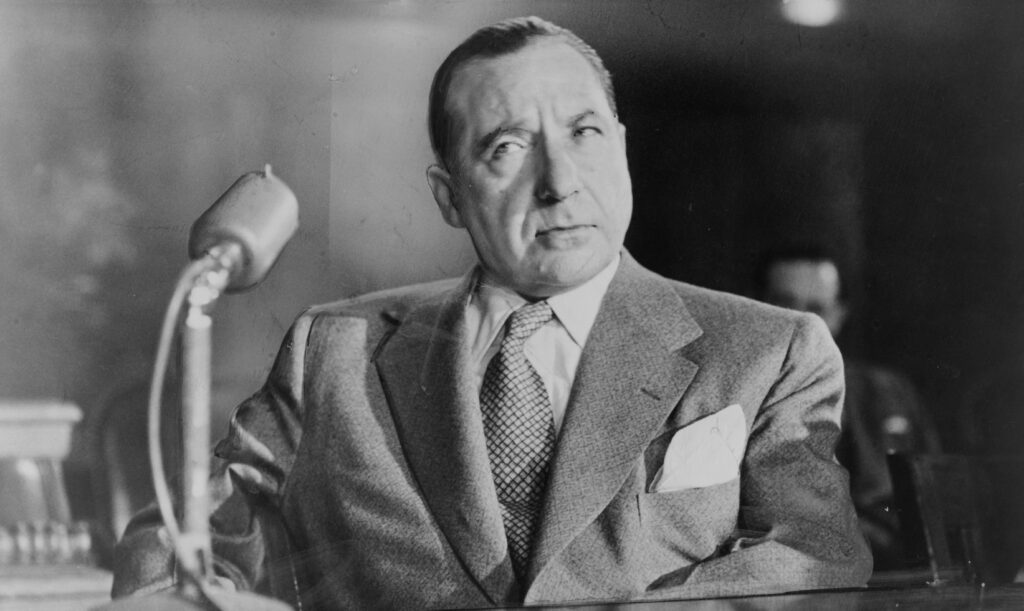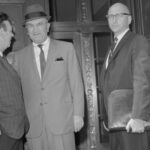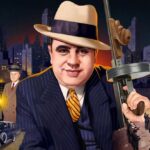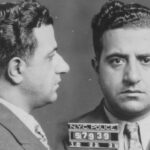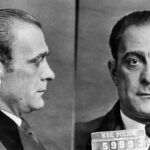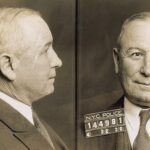Frank Costello, born Francesco Castiglia, was more than just a mobster; he was a complex individual who navigated the treacherous waters of organized crime while also wielding significant influence in political circles. Born in Lauripoli, Calabria, Italy, in 1891, Costello immigrated to the United States at the tender age of four. His life in Manhattan began modestly, but ambition and a knack for strategic alliances propelled him into the annals of criminal history.
Early Life – The Making of a Mobster
Frank Costello’s early years in Manhattan were a crucible that shaped his future in organized crime. The Five Points Gang, which dominated Lower Manhattan, was his first introduction to the criminal underworld. This notorious group was a melting pot of criminal activities, from petty theft to violent crimes. Costello’s involvement with the gang was not a casual dalliance; it was an intense, formative experience that exposed him to the harsh realities of life on the streets. Arrests for assault, robbery, and weapons possession were frequent occurrences, but they also served as a brutal education in the mechanics of crime and survival.
The year 1918 marked a turning point in Costello’s life. His marriage was not just a personal milestone; it was a strategic decision that influenced his approach to organized crime. The vow to never carry a gun again was not a mere sentimental gesture. It was a calculated move that set him apart from his more violent contemporaries. By eschewing firearms, Costello signaled a shift towards a more cerebral form of criminality, one that relied on wit, strategy, and connections rather than brute force. This decision had a lasting impact, shaping his career for decades and earning him a reputation as a thinker among thugs.
The Prohibition Era – A Golden Opportunity
The Prohibition era was a watershed moment in American history, creating a fertile ground for organized crime. For Frank Costello, it was an unparalleled opportunity to expand his criminal empire. Teaming up with notorious figures like Lucky Luciano, Vito Genovese, and Meyer Lansky wasn’t just about pooling resources; it was about creating a syndicate with diverse skills and networks. Each of these men brought something unique to the table. Luciano had a knack for organization, Genovese was ruthless and ambitious, and Lansky was a financial wizard. Together, they formed a formidable alliance that dominated the illegal alcohol trade.
Costello’s role in this syndicate was multifaceted. His business acumen was a crucial asset, enabling the group to maximize profits and minimize risks. His alliance with Joe “The Boss” Masseria in 1922 was a strategic move that gave him access to Masseria’s extensive bootlegging and rackets operations. But Costello was not one to be confined by ethnic loyalties. His decision to collaborate with Irish gangs was a masterstroke that expanded his influence and diversified his revenue streams. The adoption of the surname “Costello” was more than a cosmetic change; it was a savvy business move that allowed him to operate freely in both Italian and Irish criminal circles. This adaptability made him a linchpin in the syndicate, capable of bridging gaps between different factions and smoothing over potential conflicts.
Legal Battles and Political Maneuvering
Frank Costello’s ability to evade long-term imprisonment was not merely a stroke of luck; it was a testament to his keen understanding of the legal system and his knack for strategic maneuvering. The 1926 indictment for importing liquor into New York City could have been a career-ending event for many, but not for Costello. While his associate Bill Dwyer faced conviction, Costello managed to extricate himself from the legal quagmire. The dismissal of charges wasn’t just a legal victory; it was a strategic coup that allowed him to absorb Dwyer’s bootlegging operations, thereby consolidating his power and resources. The friction this caused with other members of Dwyer’s organization was not an oversight but a calculated risk. Costello knew that the benefits of absorbing Dwyer’s operations far outweighed the potential conflicts it could generate.
But Costello’s ambitions were not confined to the criminal arena. His foray into politics was a calculated extension of his influence, achieved through the strategic use of wealth and connections. Attending the Democratic National Convention in 1932 was not a casual political dalliance. It was a deliberate move to cement his status as a power broker, capable of influencing not just local but national politics. His role in securing Franklin D. Roosevelt’s presidential nomination was not an isolated incident but part of a broader strategy to build a network of political allies who could be called upon when needed. This political clout was not just for show; it was a functional tool that Costello used to protect his interests and expand his empire.
The Rise to the Top
The 1930s were a tumultuous decade for organized crime, marked by betrayals, convictions, and power struggles. The conviction of Lucky Luciano on prostitution charges in 1936 could have destabilized the entire criminal enterprise, but Costello was prepared. Vito Genovese’s subsequent indictment and flight to Italy presented another potential crisis, but again, Costello was ready to seize the reins. His ascent to leadership was not an accidental byproduct of his rivals’ misfortunes; it was the result of years of careful planning and positioning.
Costello’s leadership style was markedly different from his predecessors and contemporaries. Expanding the family’s operations to include slot machines in Louisiana and illegal gambling in Florida and Cuba was not just about diversification; it was about creating a multi-regional empire that could withstand local shocks and law enforcement crackdowns. His ventures into legitimate industries like poultry and meatpacking were not just a facade for his illegal activities; they were independent revenue streams that added layers of resilience and complexity to his financial portfolio.
Costello’s decision to avoid drug importation was not merely a moral stance but a strategic one. He recognized the high risks associated with the drug trade, including increased law enforcement scrutiny and the potential for violent conflict with rival gangs. By focusing on less risky but highly profitable ventures, Costello was able to maintain a lower profile while still amassing considerable wealth.
The Kefauver Hearings – A Public Fall from Grace
The Kefauver Committee hearings of the early 1950s were a seismic event in the public’s perception of organized crime, and for Frank Costello, they were nothing short of catastrophic. The Senate investigation, led by Senator Estes Kefauver, was not just another legal hurdle; it was a high-stakes public spectacle broadcast on national television. Costello’s evasive answers and palpable nervousness under questioning were not merely personal failings; they were strategic blunders that eroded his carefully constructed public persona. The conviction for contempt of the Senate was not just a legal setback; it was a reputational blow from which he would never fully recover.
The 18-month prison sentence that followed was not just a period of incarceration; it was a hiatus that allowed his rivals to consolidate power and plan their next moves. During this time, Costello’s influence waned, and his once-loyal associates began to question his leadership. The Kefauver hearings were not just an exposé of organized crime; they were a turning point that marked the beginning of the end for Costello’s reign. The hearings also had a ripple effect on the entire organized crime landscape, leading to increased scrutiny and law enforcement action against other mob figures. Costello’s fall from grace was not an isolated event; it was part of a broader societal shift that signaled the decline of the mob’s golden era.
The Assassination Attempt and Retirement
The 1957 assassination attempt on Frank Costello was not just a failed hit; it was a watershed moment that signaled a tectonic shift in the power dynamics of the New York underworld. Orchestrated by Vito Genovese, the attempt was not merely an act of personal animosity; it was a calculated political move aimed at eliminating a rival and consolidating power. The hitman, Vincent “The Chin” Gigante, was not just another mob enforcer; he was a rising star in the Genovese family, handpicked for this high-profile mission. The fact that the bullet merely grazed Costello’s head was not just a stroke of luck; it was a moment of serendipity that allowed him to reassess his life choices and priorities.
Costello’s decision to step down and cede control of the Luciano family to Genovese was not an act of surrender; it was a strategic retreat. By stepping away from the front lines, Costello was able to preserve his life and his fortune, shifting his focus to less risky ventures like gambling operations. His role as an adviser to younger mob bosses was not a demotion; it was a transition to a new phase of his career, one that allowed him to leverage his decades of experience and insights. His continued involvement in various business ventures until his death in 1973 was not just a way to pass the time; it was a means of maintaining his influence and leaving a lasting legacy.
Lesser-Known Facts About Frank Costello
The Man of Many Names
Frank Costello wasn’t always known by this moniker. Born Francesco Castiglia, he adopted the name “Frank Costello” to blend in with Irish gangs during his early criminal career. This strategic name change was more than a mere alias; it was a calculated move to expand his influence beyond Italian circles. It allowed him to form alliances with Irish mobsters, thereby diversifying his criminal portfolio and increasing his reach.
The Philanthropic Mobster
While Costello’s criminal activities are well-documented, fewer people know about his philanthropic efforts. He was known to donate large sums of money to Catholic charities and churches. This wasn’t just an attempt to launder money or gain social acceptance; Costello genuinely believed in giving back to the community. His charitable activities also served as a strategic move to build relationships with influential figures in the religious community, thereby adding another layer to his complex persona.
The Man Who Hated Drugs
In an era when many mobsters were diversifying into the lucrative drug trade, Costello made a conscious decision to steer clear of narcotics. He viewed drug trafficking as a dirty business that brought unwarranted attention from law enforcement agencies. This decision set him apart from his contemporaries and allowed him to maintain a relatively clean public image, despite his involvement in other illegal activities.
The Intellectual Mobster
Costello was an avid reader and had an extensive library at his residence. His intellectual pursuits were not limited to literature; he was also interested in politics and history. This intellectual curiosity was a rarity among mobsters of his time and contributed to his unique approach to organized crime. Costello believed that knowledge was power, and he used his intellectual assets to outmaneuver his rivals and navigate the complex world of criminal enterprises and political machinations.
The Failed Assassin and the “Miracle” Survival
While it’s widely known that Costello survived an assassination attempt, the details of this event are nothing short of miraculous. The hitman, Vincent “The Chin” Gigante, was a skilled shooter. Yet, the bullet merely grazed Costello’s head, leading many to believe that his survival was nothing short of a miracle. This event didn’t just save Costello’s life; it also marked a turning point in his career, leading him to reconsider his involvement in organized crime and eventually step down from active leadership.
The Man Who Almost Wrote a Memoir
In the twilight years of his life, Costello began talking to crime author Peter Maas for a proposed biography. These conversations were a departure from the code of silence, or omertà, that he had upheld for most of his life. Unfortunately, Costello passed away before the book could be completed, taking many of his secrets with him. This aborted attempt at a memoir leaves us wondering what revelations it might have contained, adding yet another layer of intrigue to his already enigmatic life.
Legacy – The Last of a Vanished Generation
Frank Costello remains a fascinating figure in the history of organized crime. His cerebral approach set him apart from his more violent contemporaries, earning him the nickname “The Prime Minister of the Underworld.” While he may have been a criminal, his influence reached into the highest echelons of politics and business, making him a complex character in the tapestry of American history.
In the end, Costello’s life serves as a cautionary tale, illustrating the perils and pitfalls of a life devoted to crime. Yet, it also offers a glimpse into a bygone era, a time when organized crime figures like Costello could rub shoulders with politicians and live lives that were as intriguing as they were illicit.

